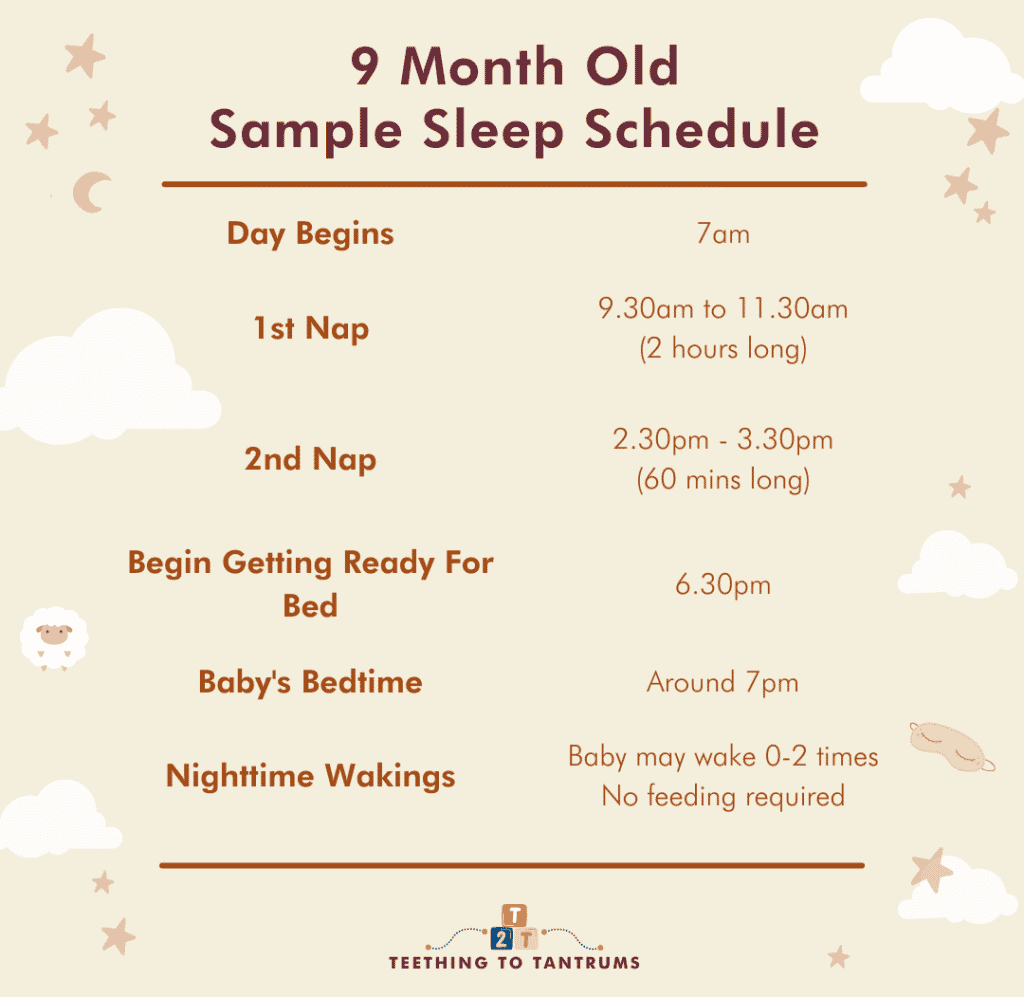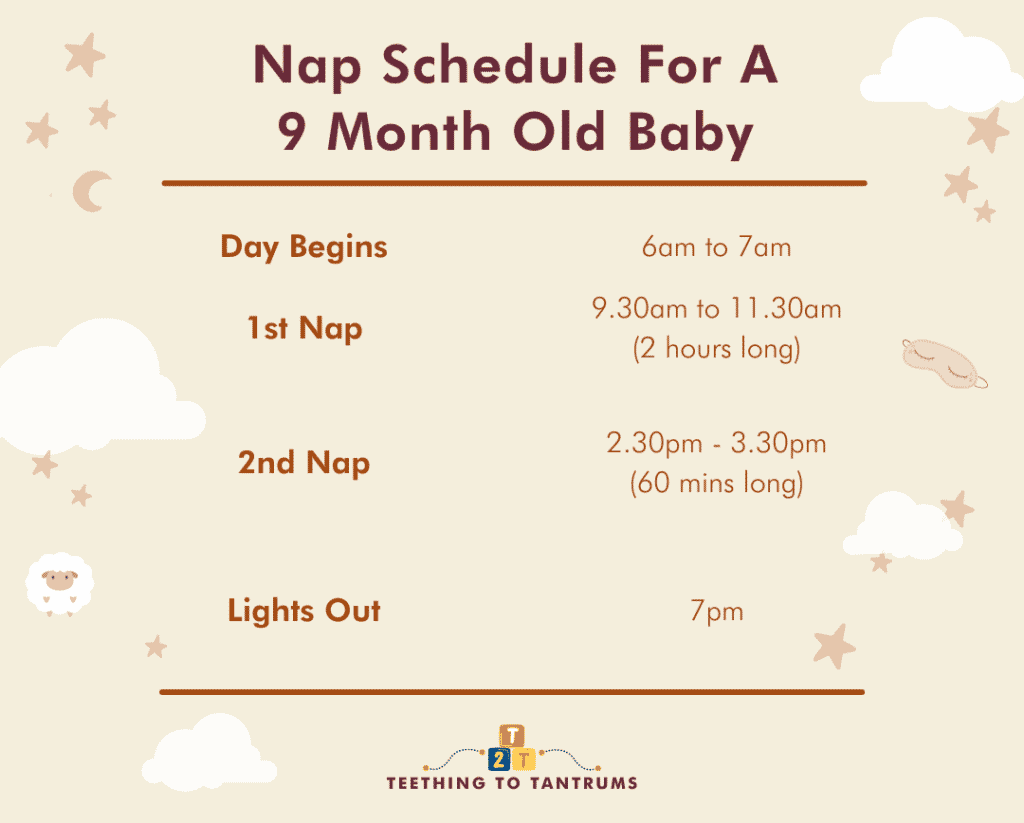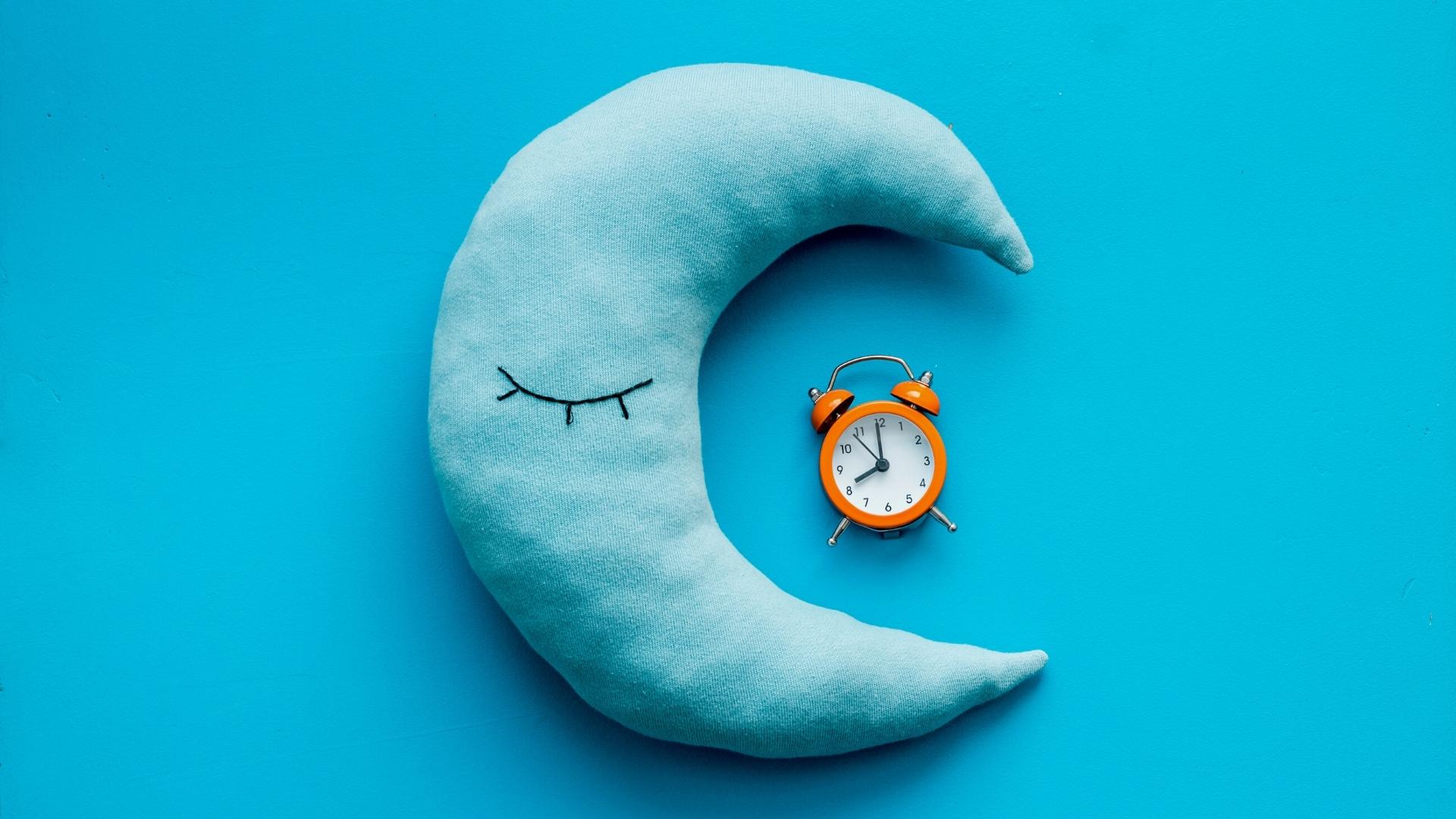Healthy sleep patterns start with a schedule. Here’s how to get your baby onto a regular 9 month old sleep schedule with top tricks to make maintaining healthy sleep habits as easy as possible.
How Much Should A 9 Month Old Sleep?
A 9 month old will sleep for 14-15 hours in a 24 hour period. They will take 11-12 hours at night and the remaining 2-3 hours of sleep will be taken across 2 daytime naps.
9 Month Old Wake Window
At 9 months, your baby will have around 2.5-3.5 hours of awake time between sleep periods.
This ensures that your baby has enough awake time during the day to meet their developmental milestones and to consume enough daytime calories to grow at a rapid rate.
Make the most of these awake times to offer your little one lots of stimulating play and opportunities to learn new skills.
TOP TIP: If your baby had a quick nap and is showing signs of being tired during their wake window (having only been awake for a short period of time…) then let them go to sleep again and DO NOT wait for ‘nap time‘. Trying to keep your baby awake will only lead to them getting overtired and being unable to settle.
Sample 9 Month Old Sleep Schedule
By 9 months old, your baby will be sleeping through the night and will still be having 2 naps per day.
This will be split into a long nap in the morning, followed by a slightly shorter nap in the afternoon.
Here’s a sample 9 month old sleep schedule to give you a guideline for how your baby’s day might flow:

REMEMBER: This 9 month old sleep schedule is a guideline and will differ from baby to baby. As you become more in tune with your baby’s needs and learn what works for them, you will find a sleep schedule that meets your needs.
Nap Schedule For 9 Month Old Baby
Here’s a quick reference for a 9 month nap schedule to help you visualise your baby’s daytime sleep habits:

How Many Naps Should A 9 Month Old Take?
At 9 months of age, your baby will now have transitioned to 2 naps a day. However, you may find they need an extra quick cat nap if their day has been incredibly busy.
Bedtime For 9 Month Old
For a 9 month old sleep schedule, your baby’s bedtime routine should now be firmly in place and it will not change much from now on.
A simple bedtime routine will consist of:
- Having a bath,
- Followed by a massage,
- Cosying up together with a suitable baby book and singing a lullaby,
- Having a feed,
- And finally, settling baby down to sleep in their crib.
When looking for a crib I really feel that one that can grow with your baby is best. This lovely crib easily adapts to a toddler bed, then day bed or full size making the transition from crib to bed easier and less stressful for your little one. Couple this with its Greenguild Gold certification and stylish design this is a real value for money crib.
The entire bedtime routine should start between 6pm and 6.30pm and take no longer than 30 minutes.
REMEMBER: The bedtime routine should follow the same steps and be repeated at the same time every evening to ensure your 9 month old can recognise the signs that bedtime is coming to help them settle and fall asleep more easily.
Looking to get your little one to sleep quickly and effortlessly? Check out my Bedtime and Nap Cheat Sheet and master the art of making daytime naps and bedtimes as seamless as possible.
A bedtime & nap cheat sheet so good your little one will ask you to put them to bed...
Laura Williams "This is a life saver! I'm so glad I downloaded your bedtime & nap cheat sheet. My little one actually asked me to put him to bed last night! Unbelievable! Thank you so much!"
Click Here For The FREE Cheat Sheet
Is There A 9 Month Old Sleep Regression?
Typically there is a sleep regression that can happen between 7-9 months old, which coincides with your baby learning to crawl, pulling to stand, teething or experiencing separation anxiety.
If you suspect your little one is going through a 9 month sleep regression, they may experience sleep issues such as:
- fighting bedtime,
- waking from naps early,
- or frequent night wakings.
Your best defence is knowing the signs of the 9 month sleep regression, learning what can trigger them and understanding how to handle them. So, be sure to take a look at my post on how to survive the 8 month sleep regression for actionable advice.
REMEMBER: Sleep regressions can occur at any age. However, they are more common when your baby is 4, 6, 8 or 12 months old, and will usually occur when your baby reaches certain developmental milestones.
9 Month Old Sleep Tips
Establishing and maintaining a 9 month old sleep schedule will make your day much easier to manage because after all… Everything starts and ends with sleep.
Here are some of my top sleep tips to make creating and maintaining a 9 month old sleep schedule as simple as possible:
- Have a regular bedtime routine. I cannot emphasise how important it is to have a consistent bedtime routine. Start the routine at the same time every day and aim to have your baby in bed at the same time each evening.
- Lower the energy at the end of the day. By 9 months old, your baby is more aware of what is going on around them and can be more easily distracted… So prepare your baby for sleep by not letting things get too exciting before bedtime. Keep your interactions calm and low-key.
- Make naps a priority. As part of establishing a healthy 9 month old sleep schedule, try and make sure that your baby takes most of their naps at home. The occasional nap on the go is inevitable and OK, but try not to do this on a daily basis.
- Encourage your baby to spend some time in their crib whilst awake to get used to their own company playing in their crib while awake. Putting your little one in the crib to look at an interesting mobile, like this one from Manhattan Toys while you take a quick shower is a good way of getting them used to being awake alone in their sleep space. This can help with teaching them to self-soothe and to not always cry out on waking too.
This award-winning crib mobile from the trusted Manhattan Toys range is perfect for entertaining your newborns without being overwhelming. It has 10 interchangeable cards that offer a range of simple high-contrast images to more complex coloured patterns and graphics to boost your little one's visual development!
- Get some fresh air every day. Fresh and natural light will help to regulate your baby’s melatonin levels, circadian rhythm and internal clock. Taking your baby outside every day for a walk in their pram or simply sitting in the garden to play on a blanket will definitely help establish a healthy 9 month old sleep schedule.
- Avoid your baby getting overtired. As your baby becomes more active and stays awake for longer periods of time it is very easy for them to become overtired, resulting in them fighting sleep. So, watch for sleep cues and ensure your little one has timely daytime naps and a consistent sleep routine.
- Check the sleep environment. Have a room thermometer to check that the room is at the correct temperature and ensure your baby is wearing the correct sleep sack for the weather. Install a night light so you don’t have to turn on bright lights to deal with nighttime wakings and use a white noise machine to help drown out background noises and create strong sleep associations.
Finding the right night light for your child can be quite a task. You want something safe, comforting, and practical. The Cozy Starry Night Light ticks these boxes, with eye-friendly warm lighting and an easy-to-use dimmer.
Its gentle glow makes it the best night light for feeding baby, diaper changes, or comforting your little one back to sleep.
As your baby grows the Cozy Starry Night Light's starry sky projection can provide comfort and gentle quiet time stimulation. Its soft lighting ensures a dreamy, peaceful environment, supporting your baby’s natural sleep cycle.
It really is a fantastic nightlight (at a very reasonable price!)
- Eye-friendly warm lighting with adjustable brightness.
- Includes a timer function for convenience.
- Projects a starry sky that is soothing for little ones.
- Rechargeable battery, so it's very portable.
- A USB adapter is not included for charging.
- The star projector is static without motion (however, this is ideal for very young babies and toddlers).
- Battery life varies based on the brightness settings.
White noise machines are a game-changer for your little one's sleep and having one that plays all night is a must. With a long-lasting battery, this compact and stylish white noise machine contains 21 non-stop relaxing noises, which will lull your little one to sleep night after night, no matter where you are!
TOP TIP: Remove your crib mobile as soon as your little one has learnt to pull to stand to reduce the chance of injury. Leave them in their crib to play with a couple of favourite toys or cloth books instead.
Common 9 Month Old Sleep Problems
The most common sleep disturbances that your baby may encounter when establishing and maintaining a consistent sleep schedule are:
- Experiencing a sleep regression.
- Early morning waking because they are more aware of the light and sounds that surround them.
- Restless settling because they are feeling discomfort from teething.
- Fighting sleep because they’re overtired.
- Crying when away from you due to separation anxiety.
- Resisting bedtime because they have not calmed down from the day.
- Night-time waking because they are used to being fed at night.
- Inability to self-soothe. Check out the video below if you need to teach baby to self-settle.
REMEMBER: Quality sleep is vital to every person’s overall health, children included.
Frequently Asked Questions About A 9 Month Old Sleep Schedule
Looking for more help with creating your baby’s 9 month sleep schedule? Find answers to the most common questions here.
Should Babies Nap After 5pm?
No. Babies should not nap after 5pm because your baby needs to be awake for at least 3 hours before their regular bedtime in order for them to be ready for sleep and settle nicely.
Therefore, if your baby’s bedtime is 7pm they should not be napping after 4pm (otherwise you will experience many sleepless nights!)
TOP TIP: If your nine month old baby does take a late 3rd nap… it’s OK to wake them up after 30 mins but I would not advise letting them sleep for longer than 1 hour.
How Much Nighttime Sleep Is Appropriate For A 9 Month Old?
As part of the 9 month old sleep schedule, your baby will be able to sleep between 11-12 hours per night. Most babies will sleep through the night, however, some 9 month olds will still wake and require your calming touch to help them resettle and drift back off to sleep.
Can You Sleep Train A 9 Month Baby?
Yes, you can sleep train a 9 month old baby. I prefer the “Gradual Retreat” and “I’ll Be Back” sleep training methods.
Having a healthy and regular sleep routine will set your baby on the right path to good sleep habits and a consistent sleep cycle for years to come.
Should I Put My 9 Month Old To Bed Early If They Missed Their Nap?
If your baby has missed a nap or has woken very early from a daytime nap, you may need to adjust their bedtime by bringing it forward.
Alternatively, you could consider incorporating a short 30-minute cat nap in the later afternoon to help tie your baby over to bedtime… But you should only do this if your baby settles to sleep quickly.
If they don’t… just bring bedtime forward by an hour.
Is 6pm Too Early For A 9 Month Old Bedtime?
No. A 6pm bedtime is not too early for a 9 month old sleep schedule.
However, if your baby does go to bed at 6pm, you need to be prepared for them to wake up by 6am the next day.
REMEMBER: As with all sleep schedules they are only a guideline and an example of what your baby’s sleep might look like. Keeping an eye on the total amount of sleep in a 24-hour period is the most important element and will allow you to work out if your baby has had enough age-appropriate sleep.
When Do I Need To Talk To A Doctor About My 9 Month Old’s Sleep Patterns?
If you are unsure if your baby’s experiencing a change in sleep patterns alongside the following, then you should seek out medical advice from a doctor, sleep expert or sleep consultant to rule out anything more sinister:
- Your baby is eating less.
- Your baby is not gaining weight.
- Your baby is having fewer than 4 wet diapers and 3 bowel movements a day.
- They are regularly sleeping for less than 6 hours at night.
- They are not falling into a consistent sleep pattern at all.
Sleep Schedules Further Reading
Here are some more sleep schedules to help you get the most out of helping your little one sleep as best they can.
After all…
Sleep breeds sleep!
- Newborn Sleep Schedule
- 1 Month Old Sleep Schedule
- 2 Month Old Sleep Schedule
- 3 Month Old Sleep Schedule
- 4 Month Old Sleep Schedule
- 5 Month Old Sleep Schedule
- 6 Month Old Sleep Schedule
- 7 Month Old Sleep Schedule
- 8 Month Old Sleep Schedule
- 9 Month Old Sleep Schedule
- 10 Month Old Sleep Schedule
- 11 Month Old Sleep Schedule
- 12 Month Old Sleep Schedule
- 13 Month Old Sleep Schedule
- 14 Month Old Sleep Schedule
- 15 Month Old Sleep Schedule
- 16 Month Old Sleep Schedule
- 17 Month Old Sleep Schedule
- 18 Month Old Sleep Schedule
- 19 Month Old Sleep Schedule
- 20 Month Old Sleep Schedule
- 21 Month Old Sleep Schedule
- 22 Month Old Sleep Schedule
- 23 Month Old Sleep Schedule
- 2 Year Old Sleep Schedule
- 30 Month Old Sleep Schedule
- 3 Year Old Sleep Schedule
Need More Parenting Help?
- Download our FREE Bedtime & Nap Sleep Cheat Sheet. It’s a free, easy-to-use and proven formula designed for parents of 0-5 year olds to master the art of consistently undisturbed and restful sleep without the yelling, nagging or exhausting long-winded evenings.
- Check out our Parenting Toolbox. You’ll get access to expertly-chosen products that you can guarantee are the best for your little one and your wallet.
- Are you looking for personalized guidance to navigate the challenges of parenting? I offer 1-on-1 consultations to bring you tailored strategies and actionable advice to help support your child's growth and well-being with confidence.

A bedtime & nap cheat sheet so good your little one will ask you to put them to bed...
Laura Williams "This is a life saver! I'm so glad I downloaded your bedtime & nap cheat sheet. My little one actually asked me to put him to bed last night! Unbelievable! Thank you so much!"
Click Here For The FREE Cheat Sheet






